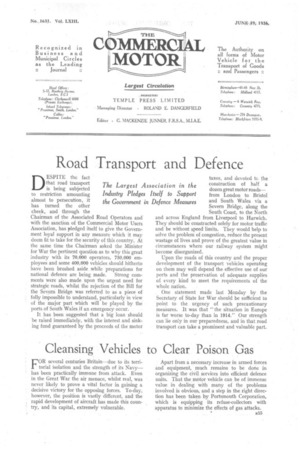Road Transport and Defence
Page 25

If you've noticed an error in this article please click here to report it so we can fix it.
DESPITE the fact that road transport is being subjected to restriction amounting almost to persecution, it has turned the other cheek, and through the Chairman of the Associated Road Operators and with the sanction of the Commercial Motor Users Association, has pledged itself to give the Government loyal support in any measure which it may deem fit to take for the security of this country. At the same time the Chairman asked the Minister for War the pertinent question as to why this great industry with its 70,000 operators, 750,000 employees and some 400,000 vehicles should hitherto have been brushed aside ,while preparations for national defence are being made. Strong comments were also made upon the urgent need for strategic roads, whilst the rejection of the Bill for the Severn Bridge was referred to as a piece of folly impossible to understand, particularly in view. of the major part which will be played by the ports of South Wales if an emergency occur.
It has been suggested that a big loan should be raised immediately, with the interest and sinking fund guaranteed by the proceeds of the motor taxes, and devoted to the construction of half a dozen great motor roads— from London to Bristol and South Wales via a Severn Bridge, along the South Coast, to the North and across England from Liverpool to Harwich. They should be constructed solely for motor traffic and be without speed limits. They would help to solve the problem of congestion, reduce the present wastage of lives and prove of the greatest value in circumstances where our railway system might become disorganized.
Upon the roads of this country and the proper development of the transport vehicles operating on them may well depend the effective use of our ports and the preservation of adequate supplies of every kind to meet the requirements of the whole nation.
One statement made last Monday by the Secretary of State for War should be sufficient to point to the urgency of such precautionary measures. It was that "the situation in Europe is far worse to-day than in 1914." Our strength can lie only in our preparedness, and in that road transport can take a prominent and valuable part.




















































































